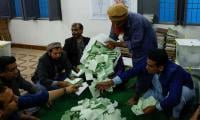KABUL: US Secretary of State Mike Pompeo arrived in the Afghan capital Monday to help break a poisonous political deadlock that has further riven the country just as the Taliban are increasing attacks and a rise in coronavirus cases threatens an already-floundering peace process.Afghanistan has been enmeshed in a political crisis since elections last year left the country in disarray due to numerous fraud claims that ultimately saw two men claiming the presidency and holding separate inaugurations.
Pompeo was to hold both separate and joint meetings with Afghan President Ashraf Ghani -- the election´s official winner -- along with his archrival Abdullah Abdullah, who also claims the presidency.
"We have tried... for the last several weeks to try to find the formula and encourage them to come to an agreement," a senior State Department official said, according to a pool report. Pompeo has come "to help push, to encourage and to point out what our expectations are and what that assessment is if they don´t do the right thing".
The top US diplomat was welcomed by special envoy Zalmay Khalilzad -- the lead US negotiator in recent talks with the Taliban -- after arriving at Kabul airport.
The visit comes just a day after the Afghan government and Taliban held their first discussion on prisoner exchanges -- a key step in a broader push for peace following a withdrawal deal signed between Washington and the militants.
The agreement established a framework for bringing to an end America´s longest war following the invasion of Afghanistan in 2001. Khalilzad tweeted Sunday it was "urgent" to quickly conclude plans for the prisoner swap -- as called for in the US pact with the Taliban -- with the coronavirus pandemic complicating diplomatic contacts.
The deal envisioned the release of up to 5,000 Taliban fighters held by Kabul, and up to 1,000 members of the Afghan government forces in insurgent hands.
That was meant to take place before the start of peace talks originally set for March 10 between the government -- which was not a party to the negotiations that produced the Doha deal -- and the Taliban.
After initially refusing to release the Taliban prisoners, Ghani announced that the authorities would free 1,500 Taliban, as a "gesture of goodwill" with plans tofree another 3,500 prisoners after the talks are underway. The Taliban rejected the offer.
The Doha accord also calls for the gradual withdrawal of American and other foreign troops over a 14-month period. The first phase of that withdrawal has already begun, though some troop movements have been slowed by the coronavirus pandemic.
In exchange, the Taliban committed to fight jihadist groups like al-Qaeda and promised to negotiate for the first time with Kabul. But since the Doha agreement was signed, the Taliban have carried out scores of attacks.
Political chaos in Kabul has further complicated matters. The spat between former chief executive Abdullah and Ghani, along with the world´s preoccupation with coronavirus, has sparked fears the window for a peace deal is closing fast.
Afghan health officials have reported just 40 cases of the novel coronavirus and one death to date. However, health experts fear the contagion is spreading as tens of thousands of Afghans have returned home in recent weeks after fleeing virus-hit Iran.
Meanwhile, Taliban-Afghan government’s Skype call revives hopes of peace process as the two sides spoke for over two hours in a Skype meeting facilitated by the United States and Qatar, officials said.
Afghanistan’s Taliban and the current government held a “virtual” meeting on prisoner releases, officials reported, breathing life back into the nascent peace process. The two sides spoke for over two hours in a skype meeting facilitated by the United States and Qatar, officials said.
“Prisoner releases by both sides is an important step in the peace process, as stated in the US-Taliban agreement,” US Special Representative Zalmay Khalilzad tweeted.
“Everyone clearly understands the coronavirus threat makes prisoner releases that much more urgent,” he said, adding that “all sides conveyed their strong commitment to a reduction of violence, intra-Afghan negotiations, and a comprehensive and permanent ceasefire.” The Taliban had previously refused to speak to the Afghan government until all prisoners were released.-
Police say that ten people were killed in Abuja and “many others” in Okija
Ministry says three drones were destroyed by air defence systems and three others by electronic warfare systems
Sanjoy Roy, 33, lone accused in case, pleads not guilty before judge in closed court in Kolkata
JUI-F chief says talks with government have been positive wherein it admitted that party’s demands were strong
Iran has poor road safety record, with 20,000 deaths reported between March 2023 and March 2024 in road accidents
"Entire nation is united to eliminate every enemy of peace," says Maryam Nawaz







